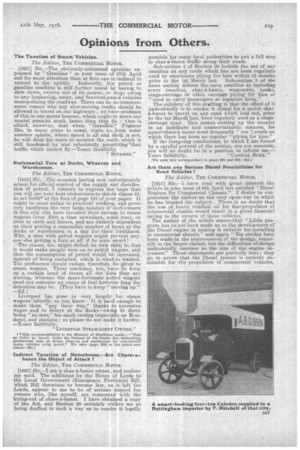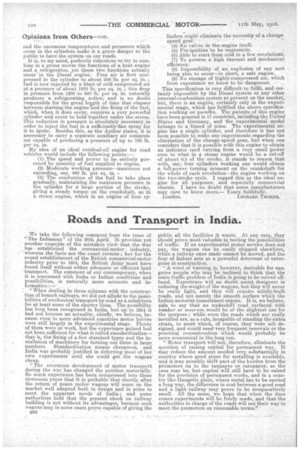Opinions from Others.
Page 17

Page 18

If you've noticed an error in this article please click here to report it so we can fix it.
The Taxation of Steam Vehicles.
The Editor, THE COMMERCIAL MOTOR.
[16211 Sir,—The obviously-unbiassed opinions ex
pressed by "Gasoline" in your issue of 27th April call for more attention than at first oneis inclined to extend to the epistle. Indirectly, the petrol or gasoline machine 18 still further taxed by having to slowdown swerve out of its course, or stop, owing to any lumbering, noisy, and funereal-paced vehicles monopolizing the roadway. There can be no commonsense reason why any slow-moving traffic should be allowed to travel on our highways ; we have evidence of this in our motor hearses, which ought to move our mortal remains much faster than they do. • One is afraid, however, that when " Gasoline " Pegasus like, in many years to come, visits us, from some summer sphere, where speed is all and sloth is not, he will drop his tears to moisten the earth which is still burdened by and reluctantly permitting Ithat traffic which cannot fly.—Yours faithfully,
" STEAMER."
Preferential Turn at Docks, Wharves and • Warehouses.
The Editor, THE COMMERCIAL MOTOR.
[1622] Sir,—The occasion having now unfortunately
arisen. for official 'control of the supply and distribution Of petrol, I venture to express the .hope that you will use your best endeavours,to delete clause 10, as set forth* at the foot of page 124 of your paper. It might be most unfair in practical -working, and press very hardlyaon the very large number Of eart-owners in this city who have invested their savings in steam wagons. (over £600 a time nowadays, mind. you), or even in carts and horses, and are entirely dependent on their getting a reasonable number of turns at the docks or warehouses in a day for' their livelihood. Why, a man with petrol wagons might prevent anyOne else getting a turn at all, if he :vvere smart!
The clause, too, might defeat its Own ends, in that it would make people turn on to petrol wagons, and thus the consumption of petrol would be increased, instead of'being curtailed, which is what is wanted. The preference should rather, therefore, he given to steam wagons. These machines, too, have to keep a certain head of steam all the time they are waiting, whereas the more-fortunate petrol wagons need not consume an ounce of fuel however long the detention may be. [They have to keep " nieving up." Liverpool 'has, gone in very largely for steam wagons-latterly, as you know. It is hard enough to Make them "pay their way," thanks to excessive Wages and to delays at the docks—owing to there being " no men," too much resting (especially on Mon days), and stations ; so please do not make it harder. —Yours faithfully, "LIVERPOOL STEAM-LORRY OWNER." I*This recommendation to the Miwistry of Munitions reads :—" Thai
Itri Order he issued, under the Defence of the Realm Act, authorising preferential turn at docks wharves and warehouses for commercial motor vehicles using pencl." We refer (page 208} to the points now Indirect Taxation of Motorbuses.—Are Chars.-a
banes the Object of Attack ?
The Editor. THE COMMERCIAL MOTOR.
[1623] Sir,----I am a char-h-b.ancs owner, and enclose
my card. The additions by the House of Lords to the Local Government (Emergency Provision) Bill, Which Bill threatens to become law, as it left the Lords, appear to me to be of serious import for owners who, like myself, are concerned with the hiring-out of chars-à-banc,s. I have obtained acopy of the Act, and Section 20 certainly strikes me as being drafted in such a way as to render it legally
possible for many Ideal authorities to put a full stop to char-k-bancs traffic along.; their roads.
Sub-section 1 of Section 20 forbids the use of any omnibus on any route which has not been regularly used by omnibuses plying for hire within 12 months prior to the 1st March last. Sub-section 3 of the same section defines the. term omnibus as including every omnibus, char-a-bancs, wagonette, brake, stage-carriage or °thincarriage plying for hire or "used to carry passengers at separate fares." The subtlety of this drafting is that the effect of it undoubtedly is to render it illegal for a motor charit-banes to travel on any road which had not, prior to the 1st March last, been regularly used as a stage, 'carriage road. This means cutting up the country in an -indefinite and unascertainable manner, for inotorchars-h-banes must frequently "use ".:;.roalls which there has been no regular "plying for hire." If the foregoing conclusions, to which I am forced by a careful perusal o f the 'section, are not accurate, you Will no doubt be in a position to inform me.—
Yours faithfully, "CAPITAL Sul." We refer this correspondent to pages DM and B10.—En.] Are there any Serious Diesel Possibilities for Road Vehicles ?
The Editor, THE COMMERCIAL MOTOR,
[1624] Sir,—I have read with great interest the article in your issue of 6th April last entitled "Diesel Engines for Commercial chassis." I desire to congratulate the author on the very .openisvay in which he has treated the subject. There is no doubt that the use of heavy residual oil for thet,propulsion of commercial chassis would result in a. great financial saving to the owners of these vehicles.
The author of the article statesethat "Little progress has as-.yet been made as to the development of the Diesel engine in making it suitable for anstalling in commercial chassis," and again "Big strides have been made in the improvement offim design, especially in the larger classes, but the difficulties ofdesign undoubtedly increase as the size of the engine decreases." These statements are perfectly true ; they go to prove that -the Diesel system is entirely unsnitable for the propulsion of .commercial vehicles,
and the enormous temperatures and pressures whichoccur in the cylinders make it a grave danger to the public to have the system on our roads.
It is, to my mind, perfectly ridiculous to try to COD17 bine in a prune mover, the functions .of a heat engine and a refrigerator, yet these two functions actually occur in the Diesel engine. Free air is first compressed in the cylinder to about 500 lb. per sq. in. ; fuel is now injected by a blast of cold compressed air at a pressure of about 1200 lb per, sq. in. ; this drop in pressure from 1200 to 500 lb. per sq. in. naturally produces a refrigerating action; and is no doubt responsible for the great length of time that elapses
between starting the engine.and the firing of the fuel,
which, when it does occur, requires a .very powerful cylinder and coverto hold together under the stress. This reduction in pressure is absolutely necessary in order to inject the fuel in a sufficiently-fine spray for it to ignite. Besides. this, as the Author states, it is necessary to carry a separate auxiliary air compressor capable of producing a pressure of up to 700 lb. per sq. in.
My idea 9f an ideal residual-oil engine for road vehicles would include the following points :— (1) The speed and power to be entirely governed by quantity of fuel supplied to engine. (2) Moderate working pressure—maximinn not exceeding, say, 300 lb. per sq. in. • • (3) The combustion of the fuel to take place gradually, maintaining the maximum pressure in the cylinder for large portion of the stroke, giving a steady torque on the crankshaft, as in a steam engine, which in an engine of four cy Enders might eliminate the necessity of a change. speed gear: (4) No valves in the engine itself. (5) Pre-ignition to be impossible. (6) Able to start from cold in a few revolutions. (7) To possess a high thermal and mechanical efficiency. (8) Impossibility of an explosion of any sort being able to occur—in short, a safe engine. (9) No storage of highly-compressed air, which from experience we know to be dangerous. This specification is very difficult to fulfil, and certainly impossible by the Diesel system or any other internal-combustion system at present on the market, but, there is an engine, certainly only in the experimental stage, which has fulfilled the above specification working on paraffin. The patents of this engine have been granted in 17 countries, including the United States and Germany, and the experimental model belongs to a friend of mine. The experimental engine has a single cylinder, and therefore it has not been possible to make any experiments regarding the elimination of the change-speed gear, but when one considers that it is possible with this engine to obtain an indicator card varying from a very small power area to what in a steam engine would be a. cut-off of about -0.3 of the stroke, it stands to reason that with, say, four cylinders working one would obtain a full-power turning moment on the crankshaft for the whole of.,each revolution--the engine working on the two-stroke cycle. I regard this as the ideal engine for all 'purposes, and especially conunercial chassis. I have no doubt that some manufacturers may care to know more.— Yours faithfully, London. LEONARD THORNE.




















